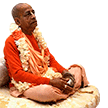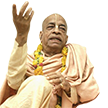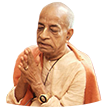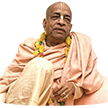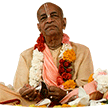Mayavada Philosophy - an essential subject: Difference between revisions
(Created page with "Category:Essential Subjects <!----------------------- edit below this line -----------------------> <!------------------------ begin introduction text --------------------...") |
(Vanibot #0041: Moves Choose Another box to the end) |
||
| Line 2: | Line 2: | ||
<!----------------------- edit below this line -----------------------> | <!----------------------- edit below this line -----------------------> | ||
<!------------------------ begin introduction text ------------------------> | <!------------------------ begin introduction text ------------------------> | ||
Māyāvāda philosophy has created this situation, that "God is impersonal, and, everyone can become God, or everyone is God." This Māyāvāda philosophy has created this havoc. Therefore Caitanya Mahāprabhu has recommended that māyāvādī haya kṛṣṇe aparādhi. "All the Māyāvādīs, they are offenders to Kṛṣṇa." Therefore they cannot make any progress in Kṛṣṇa consciousness. Unless they accept the supreme position of the Lord, they can not advance in their spiritual life. | |||
Srila Prabhupada's books, lectures, conversations and letters offer a comprehensive presentation of this essential subject as seen in the Vaniquotes '''[[Vaniquotes:Category: Mayavada Philosophy| Mayavada Philosophy]]''' category. An introduction from his books is given below in the following | Srila Prabhupada's books, lectures, conversations and letters offer a comprehensive presentation of this essential subject as seen in the Vaniquotes '''[[Vaniquotes:Category: Mayavada Philosophy| Mayavada Philosophy]]''' category. An introduction from his books is given below in the following 10 quotes. | ||
<!-------- end introduction text and don't touch next three lines ---------> | <!-------- end introduction text and don't touch next three lines ---------> | ||
---- | ---- | ||
== Quotes from Srila Prabhupada's books == | == Quotes from Srila Prabhupada's books == | ||
<!----------------- edit quote boxes below this line -----------------> | <!----------------- edit quote boxes below this line -----------------> | ||
{{VaniQuotebox| | {{VaniQuotebox|Absence of consciousness is called nirvana in Mayavada philosophy| As long as the soul and the body are combined, we can understand that there is life. But when they are separated, there is no manifested existence of the body or the soul. This question asked by Devahūti of Kapiladeva is more or less impelled by the philosophy of voidism. The voidists say that consciousness is a product of a combination of matter and that as soon as the consciousness is gone, the material combination dissolves, and therefore there is ultimately nothing but voidness. This absence of consciousness is called nirvāṇa in Māyāvāda philosophy. '''(Śrīmad-Bhāgavatam 3.27.17)'''}} | ||
{{VaniQuotebox| | {{VaniQuotebox|According to Mayavada philosophy, the Lord is a product of this material nature and the living entity is in the lowest stage of ignorance. That is the sum and substance of Mayavada philosophy| All products of the three modes of material nature are covered by ignorance, and all are different from the supreme cause and effect. This ignorance is manifested in a collective and individual sense. Collective ignorance is called viśuddha-sattva-pradhāna. When that viśuddha-sattva-pradhāna is manifested within the ignorance of material nature, it is called the Lord, and the Lord manifests all kinds of ignorance. Therefore He is known as sarvajña." Thus according to Māyāvāda philosophy, the Lord is a product of this material nature and the living entity is in the lowest stage of ignorance. That is the sum and substance of Māyāvāda philosophy. '''(Teachings of Lord Caitanya, Chapter 19)'''}} | ||
{{VaniQuotebox| | {{VaniQuotebox|According to Mayavada philosophy, this manifested world, or material world, is mithya or maya, false. The Mayavadi preaching principle is brahma satyam jagan mithya: "Only the Brahman effulgence is true, and the cosmic manifestation is illusory, or false"|According to Māyāvāda philosophy, this manifested world, or material world, is mithyā or māyā, false. The Māyāvādī preaching principle is brahma satyaṁ jagan mithyā: "Only the Brahman effulgence is true, and the cosmic manifestation is illusory, or false." But according to Vaiṣṇava philosophy, this cosmic manifestation is true because it is caused by the Supreme Personality of Godhead. In the Bhagavad-gītā the Lord says that He enters within this material world by one of His plenary portions and thus the creation takes place. From the Vedas also we can understand that this asat, or temporary cosmic manifestation, is an emanation from the supreme sat, or fact. '''(Kṛṣṇa Book, Chapter 87)'''}} | ||
{{VaniQuotebox| | {{VaniQuotebox|All Vedic literature aims at understanding Krsna. Mayavada philosophy, however, has deviated everyone from Krsna. Therefore there is a great need for the Krsna consciousness movement all over the world to save the world from degradation|Anyone who hears commentary on the Vedānta-sūtra from the Māyāvāda school is completely doomed." As explained in the Bhagavad-gītā (15.15), vedaiś ca sarvair aham eva vedyaḥ: all Vedic literature aims at understanding Kṛṣṇa. Māyāvāda philosophy, however, has deviated everyone from Kṛṣṇa. Therefore there is a great need for the Kṛṣṇa consciousness movement all over the world to save the world from degradation. Every intelligent and sane man must abandon the philosophical explanation of the Māyāvādīs and accept the explanation of Vaiṣṇava ācāryas. One should read Bhagavad-gītā As It Is to try to understand the real purport of the Vedas. '''(Caitanya-caritāmṛta, Ādi-līlā 7.128)'''}} | ||
{{VaniQuotebox| | {{VaniQuotebox|Liberation cannot be attained unless one is completely free from the modes. In any case, the Mayavada philosophy keeps one conditioned|The impersonalist may consider himself a brāhmaṇa and may be situated in the mode of goodness, but nonetheless he is conditioned by one of the modes of material nature. This means that he is not yet liberated, for liberation cannot be attained unless one is completely free from the modes. In any case, the Māyāvāda philosophy keeps one conditioned. If one becomes a Vaiṣṇava through proper initiation, he automatically becomes a brāhmaṇa. There is no doubt about it. '''(Caitanya-caritāmṛta, Madhya-līlā 15.277)'''}} | ||
{{VaniQuotebox| | {{VaniQuotebox|Lord Caitanya exposed many defects in the Mayavada philosophy, and although the Bhattacarya tried to establish himself by logic and word jugglery, Lord Caitanya was able to defend Himself from his attacks|Lord Caitanya exposed many defects in the Māyāvāda philosophy, and although the Bhaṭṭācārya tried to establish himself by logic and word jugglery, Lord Caitanya was able to defend Himself from his attacks. The Lord established that the Vedic literature is meant for three things: understanding our relationship with the Absolute Supreme Personality of Godhead, acting according to that understanding, and achieving the highest perfection of life, love of Godhead. Anyone who tries to prove that the Vedic literature aims at anything else must be a victim of his own imagination. '''(Teachings of Lord Caitanya, Chapter 26)'''}} | ||
{{VaniQuotebox| | {{VaniQuotebox|Mayavada philosophy enunciates that the whole spirit exists, but a part of it, which is called the jiva, is entrapped by illusion. This philosophy, however, is unacceptable because spirit cannot be divided like a fragment of matter|The individual soul is a particle from the very beginning. One should not think that because the individual soul is a particle, it is fragmented from the whole spirit. Māyāvāda philosophy enunciates that the whole spirit exists, but a part of it, which is called the jīva, is entrapped by illusion. This philosophy, however, is unacceptable because spirit cannot be divided like a fragment of matter. That part, the jīva, is eternally a part. As long as the Supreme Spirit exists, His part and parcel also exists. As long as the sun exists, the molecules of the sun's rays also exist. '''(Śrīmad-Bhāgavatam 3.25.17)'''}} | ||
{{VaniQuotebox|Mayavada philosophy explains this phenomenal world to be false, but Vaisnava philosophers do not agree. They know that the phenomenal world is a temporary manifestation, but it is not false|This is a discussion on impersonal Māyāvāda philosophy and the practical philosophy of Vaiṣṇavas. The Māyāvāda philosophy explains this phenomenal world to be false, but Vaiṣṇava philosophers do not agree. They know that the phenomenal world is a temporary manifestation, but it is not false. A dream that we see at night is certainly false, but a horrible dream certainly affects the person seeing it. The soul's fatigue is not factual, but as long as one is immersed in the illusory bodily conception, one is affected by such false dreams. '''(Śrīmad-Bhāgavatam 5.10.21)'''}} | |||
{{VaniQuotebox|Mayavada philosophy supports the impersonalist view that Narayana, the Supreme Personality of Godhead, has no form. One can imagine impersonal Brahman in any form - as Visnu, Lord Siva, Vivasvan, Ganesa or Devi Durga |Māyāvāda philosophy supports the impersonalist view that Nārāyaṇa, the Supreme Personality of Godhead, has no form. One can imagine impersonal Brahman in any form—as Viṣṇu, Lord Śiva, Vivasvān, Gaṇeśa or Devī Durgā. According to the Māyāvāda philosophy, when one becomes a sannyāsī he is to be considered a moving Nārāyaṇa. Māyāvāda philosophy holds that the real Nārāyaṇa does not move because, being impersonal, He has no legs. Thus according to Māyāvāda philosophy, whoever becomes a sannyāsī declares himself Nārāyaṇa. Foolish people accept such ordinary human beings as the Supreme Personality of Godhead. This is called vivarta-vāda. '''(Caitanya-caritāmṛta, Madhya-līlā 18.109)'''}} | |||
{{VaniQuotebox|Mayavada philosophy tries to designate the Lord as contaminated by a material body when He accepts forms of incarnation. This sort of interpolation is completely denied herein by the explanation that the Lord's position is pure and unalloyed|Māyāvāda philosophy tries to designate the Lord as contaminated by a material body when He accepts forms of incarnation. This sort of interpolation is completely denied herein by the explanation that the Lord's position is pure and unalloyed in all circumstances. According to Māyāvāda philosophy, the spirit soul, when covered by nescience, is designated as jīva, but when freed from such ignorance or nescience he merges in the impersonal existence of the Absolute Truth. '''(Śrīmad-Bhāgavatam 2.6.40-41)'''}} | |||
<!----------------- edit quote boxes above this line -----------------> | <!----------------- edit quote boxes above this line -----------------> | ||
| Line 31: | Line 36: | ||
''' Mayavada Philosophy - [[Vaniquotes:Category: Mayavada Philosophy|explore more within this category]]'''. | ''' Mayavada Philosophy - [[Vaniquotes:Category: Mayavada Philosophy|explore more within this category]]'''. | ||
{{EsentialSubjectTotal}} | {{EsentialSubjectTotal}} | ||
<div style="float:left;"> | |||
{{EssentialSubjectnav}} | |||
</div> | |||
__NOTOC__ | __NOTOC__ | ||
__NOEDITSECTION__ | __NOEDITSECTION__ | ||
Latest revision as of 16:54, 22 November 2020
Māyāvāda philosophy has created this situation, that "God is impersonal, and, everyone can become God, or everyone is God." This Māyāvāda philosophy has created this havoc. Therefore Caitanya Mahāprabhu has recommended that māyāvādī haya kṛṣṇe aparādhi. "All the Māyāvādīs, they are offenders to Kṛṣṇa." Therefore they cannot make any progress in Kṛṣṇa consciousness. Unless they accept the supreme position of the Lord, they can not advance in their spiritual life.
Srila Prabhupada's books, lectures, conversations and letters offer a comprehensive presentation of this essential subject as seen in the Vaniquotes Mayavada Philosophy category. An introduction from his books is given below in the following 10 quotes.
Quotes from Srila Prabhupada's books
Mayavada Philosophy - explore more within this category.
Vanipedia has now over 903 introductory articles compiled from Srila Prabhupada's books under the series titled Essential Subjects. All these articles can be seen in the Table of Content on the right side of this article and also here in this Umbrella Category. Browse through them to relish the breadth and depth of Srila Prabhupada's teachings - There is a subject for everyone.
